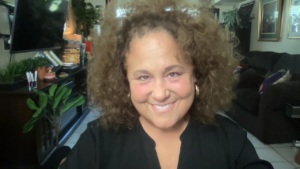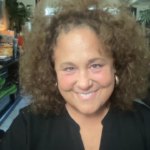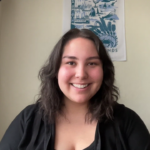Description
Della Kostelnik Juarez (61) tells her daughter Julia Juarez-Kostelnik (22) about her experiences participating in a voluntary bussing/racial transfer program as an elementary school student in Seattle. Della describes how being the only white kid in a predominantly Black school profoundly shaped her identity and how she moves through the world. Together, Della and Julia reflect on the challenges of being a biracial family, Julia's own experiences in school, and the value of being in diverse spaces.Subject Log / Time Code
- Della Kostelnik Juarez (DK) says that in high school she wanted to go into broadcasting because she was inspired by her principal, Roberta Byrd Barr.
- DK talks about her how parents' backgrounds and their dream of starting an international school influenced their hopes for her future. "We wanted you to be uncomfortable in all-white spaces."
- DK talks about her family participating in Seattle's voluntary bussing program. When DK was in elementary school in 1971, she started taking the public bus 45 minutes across town to TT Minor elementary school where she was the only white student. She explains that there was no conversation or choice in the matter, which is different than how she raises her own daughter. DK says the distance from home was the most challenging part, but her parents were frustrated with the lack of participation in the city's voluntary bussing program to integrate schools, so they stepped up.
- DK explains the difference between voluntary bussing and mandatory bussing, which came later. DK's family actually participated in a voluntary racial transfer, so there wasn't even a school bus provided yet. She had to take the public bus.
- Julia Juarez-Kostelnik (JJ) briefly compares her experience in elementary school to her mom's. JJ actually started out at the same elementary school her mom did — Green Lake Elementary School. DK explains that transferring from Green Lake to TT Minor was a transformative experience for her. She had been bullied at Green Lake, often because of her immigrant father, and wasn't happy. But she made friends at TT Minor and loved her teachers, and especially the real-world lessons they taught in math class.
- DK recalls realizing a few weeks into her time at TT Minor that she was the only white person, and that on one cared.
- DK talks about when her dad was killed. It got too hard for her single mom to send her across town, so she dropped out of school and stayed home to take care of her siblings. Suddenly she was grocery shopping, balancing the checkbook, and using the math lessons she had learned at TT Minor.
- DK talks about finally going back to Green Lake and hating it, but then mandatory bussing started in middle school and she was transferred to Hamilton where she was reunited with friends from TT Minor. DK mentions that many of these people are friends to this day — JJ calls them aunts and uncles.
- JJ asks what efforts were made to welcome Black students during integration. DK says it wasn't perfect but describes the diversity of Hamilton. "It was just a blast." JJ says she loves looking through her mom's photos and yearbooks.
- DK talks about going to Lincoln High School with all her friends, which is where she met Roberta Byrd Barr. She also describes the climate of the time — Desegregation was still happening, refugees were arriving from Vietnam after the war, Title Nine was emerging. DK says there were fights, but rarely about race.
- JJ asks how volunteer bussing shaped her mom. DK says she never felt comfortable in all-white spaces afterwards. "There are stories and people missing in all-white spaces...If you're walking into an all-white space, there's something wrong."
- DK mentions getting divorced, being a single mom, and sending JJ to Green Lake Elementary School. It was still mostly white and she noticed that when JJ (who is Mexican-American) drew self-portraits, she had blonde hair and blue eyes. Both DK and JJ talks about a racist teacher who repeatedly accused a Black kindergarten boy of stealing. DK realized she needed to get JJ out of the school and they found Olympic Hills — an international school further from home.
- DK gets emotional talking about the transformation she saw in JJ from her self-portraits to coming home talking about hijab fashion. "I don't know how anyone would not want that."
- JJ reflects on what their parallel experiences in school meant for both of them. She always wants to challenge the spaces they move through in life.
- DK describes the early days of riding the public bus to TT Minor.
- DK talks about where her parents' liberal views came from. Her mom grew up in a racist, white family in Everett, Washington during the Civil Rights Movement. She saw injustices around her but had no one in her life to talk to about it or guide her to take action. She studied education at the University of Washington and decided she wanted to open a diverse, international school. The school never happened, but she and her husband decided to put their daughter (DK) in a diverse space for school. JJ adds that her grandparents were very political people.
- DK says she had Black and Indigenous foster siblings. She also says her dad immigrated (from the Czech Republic) to work with the CIA. He was frequently threatened with deportation for his civil rights work. JJ adds that her grandma was incredibly strong after her husband was killed.
- DK says she didn't have many friends in her neighborhood, so there weren't any reactions to her attending a predominantly Black school.
- DK talks about her high school principal, Roberta Byrd Barr (RBB) and how RBB taught DK to strategize in her political work. She helped DK file a complaint against a racist, sexist teacher and successfully got him fired. DK says RBB was a good sounding board for an angry young feminist.
- DK describes RBB's deep voice and the look she would give when you were doing something you shouldn't. She recounts an incident when she wanted to tear up all the outdated, racist textbooks and RBB asked what anyone would learn from that. So instead, she helped DK write accurate history in the margins so that people could look it up. DK says "She was everything to me."
- DK talks about her complicated racial identity. She often felt embarrassed to be white and more comfortable in non-white spaces. She mentions that JJ often challenges her on whether her words or actions might be considered racist or cultural appropriation. JJ responds honestly about the tough conversations they have about race and how comfortable she feels talking to her mom.
- DK says desegregation is a moving and fluid process and you have to be constantly learning and growing. DK and JJ constantly push each other into uncomfortable situations, and they also mention what they appreciate and admire about each other.
- DK mentions intersectionality's emergence in the feminist movement and ties it to her own experiences growing up in Seattle. It was a moment of realization for her about how much her schooling shaped her.
Participants
- Della Kostelnik Juarez
- Julia Juarez-Kostelnik


